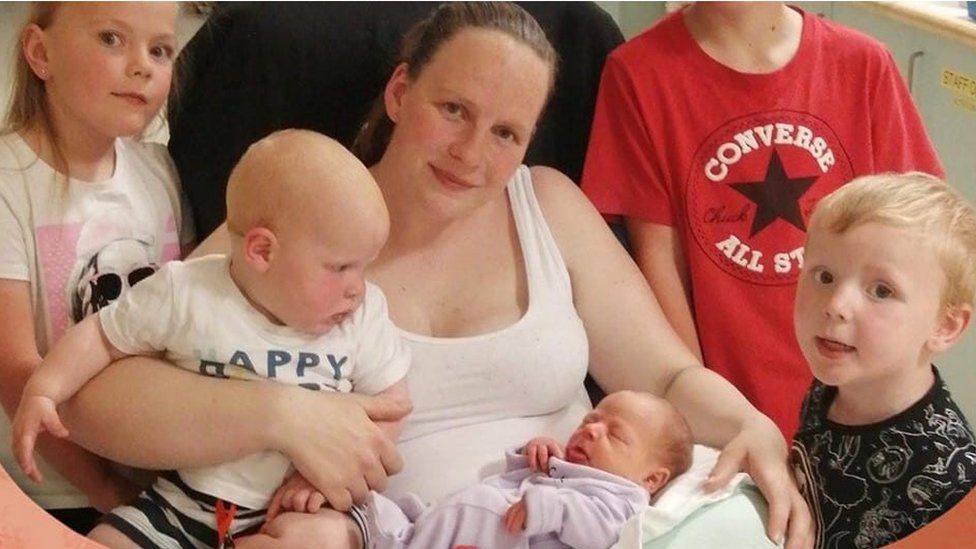ARTICLE AD BOX
 Image source, Family handout
Image source, Family handout
Sophie says she sometimes goes without in order to feed her children
By Eleanor Lawrie
Social affairs reporter, BBC News
Almost half a million households are now affected by a cap on some benefits, according to the Resolution Foundation think tank.
The two-child cap, which was introduced in 2017, restricts child tax credit and universal credit to the first two children in most households.
It means families cannot claim about £3,200 a year per extra child, the think tank says.
The government says it is helping with the cost of living.
'Everything has gone up'
The 2017 two-child benefit limit means most families cannot claim means-tested benefits and tax credits for any additional children born after this date.
Separately, more than 100,000 families are affected by the benefit cap, which limits the amount of support that out-of-work families can claim.
Mum-of-five Sophie says money is so tight that she regularly goes without in order to feed her children.
Her toddler has a serious bowel condition so needs specialist products, such as incontinence pads, but he does not qualify for additional disability benefit.
"It does make me feel anxious. Sometimes it's between me eating dinner and his medical needs, and obviously I will always choose the children's needs over mine," she says.
She believes financial support should be capped at three or four children.
"Things are tight now because everything has gone up [in price]. There has to be a limit somewhere but I wish the government would look at each case individually - you can't judge a book by its cover."
'Every month is a struggle'
Danielle lives in Fulham, west London, with her four children, aged 12, five, three and seven months.
She says: "I feel like they're looking at me and my children as numbers, not as people.
"To me, every month is a struggle. They need new trousers and new underwear, or they've broken something and I need to fix it, or we need new furniture.
"It's the same all year round, every month. I feel like I have to choose which child I'm going to buy something for each month. Who's going to get forgotten about this month? Who takes priority?"
Image source, Family handout
Image caption,Danielle (centre) and her children are affected by the two-child benefit limit
The charity Barnardo's, which has been supporting Danielle, argues that the policy is unfair.
"The two-child limit on benefits is one of the biggest policy drivers of child poverty," Barnardo's chief executive Lynn Perry says.
"The majority of families receiving universal credit are in work, and many are struggling for reasons beyond their control - such as a family break-up, the death of a partner, or someone losing a job amid the cost-of-living crisis."
The Resolution Foundation's research also suggests:
- Half of families with three children or more will be in poverty by 2028-29, up from a third in 2013-14
- At the same time, the number of two-child families in poverty is expected to stay the same, at one in four
- Six out of 10 families affected by the two-child limit are in work
- Larger families are significantly more likely to use food banks
Families hit by the limit can still claim child benefit, help with childcare costs and support for disabled children, if they meet the relevant criteria.
Some are also affected by the benefit cap, which came into effect in 2013. It limits the amount of benefits most working-age households can receive, if they work fewer than 16 hours a week, with some exceptions.
'I couldn't have pre-empted it'
Almost half of those affected by the two-child benefit limit are single parents, such as Frances, in London. Her third child was still a baby when her relationship with her husband broke down, and he doesn't support the family financially.
Her children are now aged 11, six, and three. Frances has "reluctantly" left her job as a business administrator as she says it wouldn't cover the cost of childcare.
"I've heard the argument that you need to plan your family, but I did plan, thinking I was in a two-parent family unit.
"But through a breakdown in the relationship, we went from an average London family to me being a single parent and having to juggle those demands and responsibility, and then going to not having an income because of that - it's not anything I could have pre-empted."
"It's really tough. As items have become more expensive, you have the same needs but the costs are exorbitant."
When the two-child limit is fully rolled-out in 2035 it is set to affect around 750,000 families. Scrapping the policy would cost about £3.6bn in today's prices by then and would lift about 490,000 children out of poverty, the report claims.
The government says it is helping families with the rising cost of living, including raising benefits by 6.7% last April, in line with inflation.
It adds there are 1.7 million fewer people living in absolute poverty - including 400,000 fewer children - compared with 2010.
"The two-child policy asks families on benefits to make the same financial decisions as families supporting themselves solely through work, and safeguards are in place to protect people in the most vulnerable circumstances," a Department for Work and Pensions spokesperson said.

 11 months ago
24
11 months ago
24








 English (US) ·
English (US) ·